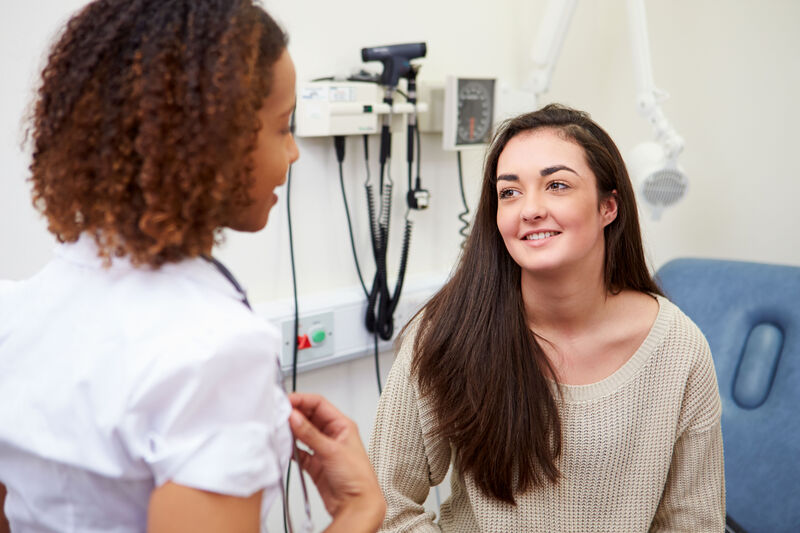Condition
Human Papillomavirus (HPV) in Teens
What You Need to Know
HPV is one of the most common STIs. Some types of HPV can cause genital warts.
Key Symptoms
Symptoms of HPV may include:
- Genital warts
Diagnosis
Doctors typically diagnose HPV by:
- Pap smear
Treatment
- Most of the time, signs of an HPV infection go away on their own

Schedule an Appointment
Our pediatric specialists provide personalized care for your child’s physical, mental and emotional health needs. Meet the providers who treat HPV and schedule an appointment today.
Frequently Asked Questions
About HPV
What is HPV?
HPV stands for human papillomavirus. There are over 150 different types of HPV, and more than 40 types are sexually transmitted.
Different types of HPV can cause genital warts, warts on your hands and feet or changes in your cervix (the opening to the uterus and part of the female reproductive system) that can lead to cancer. The types of HPV that cause genital warts are different from the types that cause cervical cancer and other types of cancer.
Both men and women can get it. In rare cases, some types of HPV can also cause cancer of the vulva (area outside and around your vagina), vagina, and anus in women, and in the anus and penis in men.
How common is HPV?
- HPV is the most common sexually transmitted infections (STIs) in the United States.
- Around 20 million people in the United States are currently infected with HPV.
- About 6 million people get it every year, and at least 50% of all sexually active people get it at some point in their lives.
- Most people fight the virus off on their own, but:
- About 1% of sexually active people in the United States have genital warts at any given time.
- Around 12,000 women get cervical cancer each year.
What can happen to me if I get HPV?
Because there are many types of HPV and each person's body can react differently to the infection, any of the following can happen if you get HPV:
- Nothing happens. The area of your body infected with the virus stays normal and you might never know you have it, but you are still able give the infection to other people. This is called a latent or inactive infection.
- You can get bumps on your genital area called genital warts. These warts almost never lead to cancer but can go away and come back throughout your life.
- If you're a woman, the infection can cause cells in your cervix to change and these changes can show up in the results of a Pap test (a screening test that you get when you visit the gynecologist). Most women start getting Pap tests when they turn 21. If you get the infection as a teenager, most of the time your body will clear the infection on its own and when you start getting Pap tests, they will be normal. However, sometimes the infection comes back or stays in your cervix, and this can lead to cervical cancer if you aren't treated early.
- Some other cancers can also be caused by HPV, like cancers of the vagina, anus, and head, neck, mouth, and throat.
How do I know if I have HPV?
Most people don't know they have HPV because they have NO SYMPTOMS. You can still infect your partner(s) with HPV even if you don't have symptoms.
For women, having a Pap test that comes back abnormal at the gynecologist's office is usually the first sign of an HPV infection. That's why it's important to start getting regular Pap tests when you are 21, or earlier if your doctor recommends it.
If you have a type of HPV that causes genital warts, you may or may not get symptoms. If you do get symptoms, they usually start out as small bumps in or around your vagina, penis or anus. Here's some information about these warts:
- They can grow in bunches or clusters.
- They can be raised or flat, and any size.
- They can be pink, red, brown or the color of your skin.
- They might itch, be painful or bleed.
Even if you do get symptoms, you might not notice them. Why? The warts or bumps can be really small and you might not see or feel them.
HPV warts can also grow on your thighs, groin, lips, mouth, tongue, throat or on a man's scrotum.
Transmission
Who is most likely to get HPV?
Any person who has sex can get HPV.
You are more likely to get HPV if:
- You start having sex at a younger age
- You are having sex with more than one person
- The person/people you are having sex with are having sex with other people
- You don't use condoms
- You or your partner(s) have had a sexually transmitted infection before
How do you get HPV?
- Any skin-to-skin contact with body parts infected by HPV, even if the person with HPV has no symptoms or signs of the infection.
- You can get HPV by having ANY type of sex; vaginal, anal and oral sex.
- Unprotected or under-protected sex. This means having sex without using condoms or using a condom, but the condom breaks, slips off or you don't use it the entire time.
- Condoms lower your chance of getting HPV, BUT they are not 100% effective in preventing HPV since the virus can live on body parts that are not covered by a condom.
How can I keep from getting HPV?
- The only 100% effective way to not get HPV is to not have sex or close skin-to-skin contact with body parts that can become infected with HPV.
- If you have sex, use a condom every time you have any type of sex. Condoms lower your chance of getting HPV, but they are not 100% effective because HPV can live on areas of the body that are not covered by a condom.
- Dental dams may also help you from getting HPV from oral sex that can cause oropharyngeal (mouth and throat) cancer.
- Get the vaccine! There are two vaccines for HPV and getting one can lower your chance of getting the virus.
- Gardasil:
- You can get this vaccine if you are 9-26 years old
- Prevents the following types of HPV:
- Types 16 and 18 which cause cervical cancer
- Types 6 and 11 which cause genital warts
- Works best in women who have not yet come in contact with the virus
- You get three shots over six months
- Who is it recommended for?:
- Females: All 11 and 12 year olds during routine vaccinations and everyone up to 26 year olds who haven't gotten the vaccine yet
- Males: 11-21 year olds for preventing HPV types 6 and 11
- Cervarix:
- You can get this vaccine if you are 10-25 years old
- Prevents the following types of HPV:
- Types 16 and 18
- You get three shots over six months
- Gardasil:
How can I keep from spreading HPV?
If you notice warts or unusual bumps on your genitals, don't have sex until you get tested and talk to a doctor about when it's ok to have sex again.
Use a condom EVERY TIME you have vaginal, anal or oral sex. Condoms aren't 100% effective at preventing HPV because the virus can live on body parts that aren't covered by a condom, but it lowers your chance of getting it.
Remember, you can still spread HPV even if you don't have symptoms.
Treatment
Can HPV be treated? How do I get rid of it?
There's not a clear answer to this question. Most of the time, signs of an HPV infection go away on their own and the virus may no longer be detectable in your body. However, in some cases the virus may just be hidden and could still cause symptoms and health problems later in your life.
If you get genital warts from an HPV infection:
- Any warts you get should go away on their own. If they don't, or if they bother you, a doctor can remove them or use a medication to make them go away.
- The method your doctor uses to get rid of the warts will depend on how many you have, how big they are, where the warts are located on your body and the cost and side effects of each treatment.
- There are some home medicines you can use to get rid of warts but they must be prescribed by a doctor.
- DO NOT use over the counter wart medicine on genital warts – these medications are too harsh for the sensitive skin around your genital area.
- Even if your warts go away or are removed, the virus can stay in your skin and can infect your partner(s) with HPV.
- Warts can also come back after they go away or are removed.
For women, if you get a type of HPV that causes changes to your cervix:
- You doctor will monitor the changes and you will probably need to get Pap tests more frequently until one of the following happens:
- Your body clears the infection on its own
- Your doctor decides to treat the affected areas of the cervix to prevent cervical cancer
If you have HPV, talk to your doctor about the different treatment choices and what will work best for you. Also let your doctor know if you think you are pregnant, since that will affect what type of treatment you should choose.
What can happen if I don't get treatment for HPV?
If you have a type HPV that can lead to cancer and you don't get treatment, you can get cancer. Around 12,000 women get cervical cancer in the United States each year.
Even though men don't get cancer from HPV as much as women do, it can still happen. Each year in the United States, HPV causes:
- Penile cancer in 400 men
- Anal cancer in 1,500 men
How do I get tested for HPV?
There is no screening test just for HPV. For women, your doctor will use results of a test called a Pap smear to monitor if there are abnormal changes in your cervix. These changes are a sign of an HPV infection.
If you think you have genital warts, your doctor will use a bright light to look at them and decide if they are caused by an HPV infection.
How often should I get tested for HPV?
If you think you have genital warts or that you have been exposed to HPV, make an appointment with a doctor.
Most women should start getting Pap tests when they turn 21. The results of these pap tests will help your doctor monitor changes in your cervix that can be caused by certain types of HPV.
Departments that Treat HPV

Pediatric Gynecology Program
When your child needs specialized gynecologic care, Children's National Hospital has the experience and expertise to provide the most appropriate care for younger patients.

Dermatology
The Division of Dermatology at Children's National Hospital continues to expand services as more families seek our expertise in the diagnosis and treatment of disorders of the skin, hair and nails. Learn more about our division.

Help Kids and Make a Difference
Invest in future cures to help children have brighter futures.





